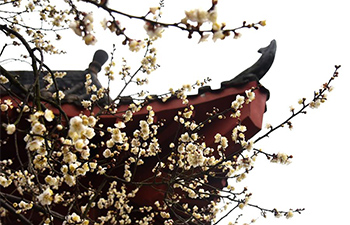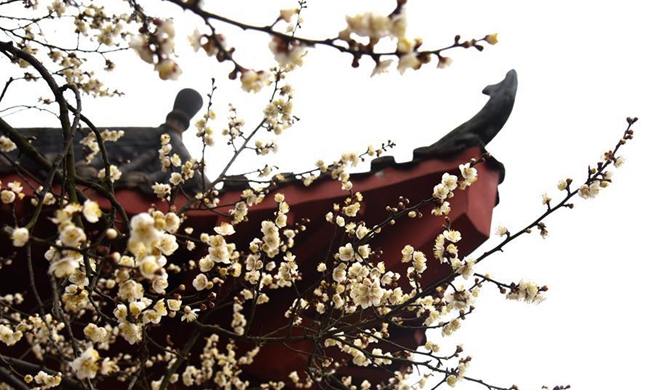NANCHANG, Feb. 16 (Xinhua) -- Zhou Haiyan is happy that up to 1,200 endangered white cranes, a third of the global population, spend winter in lotus root fields near Poyang Lake, China's largest freshwater lake.
Zhou, a photography enthusiast, nearly missed the cranes this winter as local farmers at Nanchang Wuxing Farm planned to plant paddy rice to replace lotus root last spring to avoid damage caused by the cranes.
"If the farmers made it into reality, the cranes would lose an ideal foraging place," said the 46-year-old former TV host.
"Lotus root contains large amounts of starch, a favourite food of the cranes who strive to find food in the lake," said Dai Nianhua, a researcher with the Jiangxi Provincial Academy of Sciences.
Yet farmers regard the cranes as a threat as they will have no harvest next year if the cranes eat the lotus root under the water.
To help the cranes stay at the farm, Zhou, together with many bird-lovers, initiated an online crowdfunding campaign on WeChat, China's most popular social network, in March last year.
They collected 2.1 million yuan (333,959 U.S. dollars) from 100 donors, including overseas Chinese from the United States and Canada.
"We rented 498 mu (33 hectares) of lotus root fields and bought 75,000 kg of lotus root for the birds," Zhou said. "We also consolidated the farmland, built new roads and a water control system."
Before the cranes arrived in November, bird-lovers managed to build the country's first privately funded white crane protection zone that combines the functions of scientific research, education and photography.
"The white crane protection zone did not spend a single penny of the government's, but effectively protects the habitat," said Dai, adding that the government should give more policy and financial support to the crane protectors.
For Zhou, funding is still the biggest problem. They have only 180,000 yuan left in their coffers, far from enough to pay the rent and buy lotus root for next winter.
"We are seeking more funding," Zhou said. "We must keep this habitat so humans and cranes can interact closely."

















